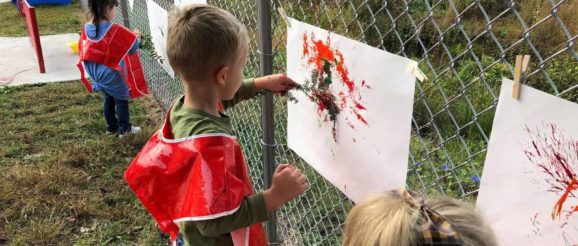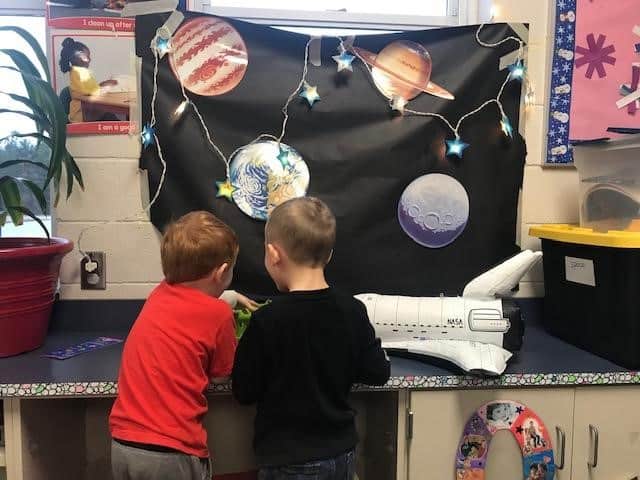Innovation in Caldwell County Schools – EducationNC

This is the fourth piece in a week-long series of perspectives on innovative practices in North Carolina public schools. Follow along with the rest of the series here.
The catalyst for innovation may begin as an isolated idea — a hope, a dream — in the creator’s mind. True innovation, however, occurs as ideas are shared and excitement is sparked within a group. The excitement of a unified group, then, generates a collective energy that, through the diffusion of innovation, has the force to transform the status quo.
In established systems such as education, the process of cultivating a culture of innovation can move incrementally, but the commitment to increasing equity and access to resources results in increased opportunities for all students. School systems that choose to innovate unleash the potential for all students to benefit from new, expanded learning experiences.
In Caldwell County Schools, innovative practices are taking root as they are valued and encouraged. As explained by Dr. Don Phipps, superintendent of Caldwell County Schools:

“Innovation must be a mindset, reflected in thoughts and ideas that lead to discussions and imagining what could be. This is difficult in many instances because it requires a person or group of people to think and consider things outside of their natural, comfortable, accepted way of doing things. As we think in innovative ways, we have to cast off the old, accepted ways, budget restraints, and political ideas that hold us captive. With a focus on the reasons why we are doing what we are doing, acknowledgment of limitations (self-imposed and others), and prospective partners, we can envision, think, design, and create in a way that removes the constraints that we often find ourselves in.”
As Caldwell County Schools move out of more traditional, isolated work environments — where a department name signifies ownership of particular roles and responsibilities — toward finding common goals in our collaborative work, we open ourselves up to navigating the complexities of innovation. Through this process, successful partnerships that demonstrate unity in stakeholders’ perspectives and actions plant the seeds for innovative practices that positively impact students and our community.
The influence of powerful partnerships is evident at all levels of learning throughout Caldwell County Schools. At the school level, passionate educators at South Caldwell High School recently innovated to create an interdisciplinary, project-based learning experience for students that reached well beyond traditional departmental divides and extended beyond classroom walls into the faith community. At the district level, leaders in preschool, STEM, and innovation and online education departments think about and do school differently through initiatives that are rooted in educational innovation.
In the following examples, district leaders in these three departments share how innovative practices are woven into the work of their departments.
NC Pre-K: Thinking outside the sandbox
Caldwell County Schools’ Preschool Program has been “thinking outside the sandbox” and innovating with NC Pre-K partners — including Smart Start, public child care providers, and privately-owned child care providers — since 2014. The program, which began with only four classrooms, has grown exponentially and now offers services at 13 schools and 19 classrooms throughout the county.
The strategically designed program provides a high-quality, enriching experience to identified at-risk children in preparation for kindergarten. As participants in a statewide social-emotional program, Caldwell’s pre-K is built on research-based inclusion practices and environments, focusing on social-emotional and literacy instructional strategies.

In Caldwell County’s Preschool Program, innovative practices — including continuous professional development, direct coaching, and individualized support for all staff — are incorporated in all classrooms. The program is a unique collaborative model within the state. It provides unified curriculum, professional development, and teacher support to NC Pre-K classrooms in both public school classroom settings and within privately-owned childcare centers.
These public-private partnerships create a cohesive program experience for all preschoolers in the program. The strength of these public-private partnerships provides fertile soil for seeds of innovation to grow.
Taking STEM on the road
STEM education in Caldwell County has been a district priority for nearly 10 years and has innovated and evolved as resources and pedagogy have changed. Today, the shift in STEM education is to forgo segmented content areas, and instead, emphasize technology as a bridge to connect all subjects.
Learning to code is an important vehicle for building this interdisciplinary bridge as coding helps students learn 21st century skills, such as critical thinking, logic, and problem solving, in addition to fostering collaboration through teamwork. Computational thinking allows students to address a challenge by looking at the big picture, breaking it into smaller pieces, then developing a hypothesis to fix the problem or improve a flawed design. The skills learned through coding bridge the gap in content area divides.
The desire to offer opportunities for Caldwell County students to practice with a STEM lens was the catalyst for the district to seek innovative, educational expansion opportunities with a focus on coding. In Spring 2019, the STEM department connected with local business and university partners and applied for a Department of Public Instruction (DPI) Coding and App Development Grant.
Grant funds — to be used to design a technology-supported, mobile STEM bus — were awarded by DPI in January 2020. The Caldwell County Schools STEM bus will serve all students in grades K-12 and will move between multiple schools, providing equitable resources for students to access hands-on learning and develop coding skills.
CIVA: Building learning bridges
The Caldwell Innovative Virtual Academy (CIVA) is a newly-developed dual enrollment option offering online courses to both public school and homeschool students. CIVA courses are developed and taught by local teachers, while students and their families have opportunities to connect with CIVA staff outside their virtual classrooms. Two CIVA courses were successfully launched in January 2020 with 12 additional courses planned for fall 2020.
CIVA’s ability to develop effective communication and partnerships with local teachers, parents, and district leaders are key to the growth of innovative practices within the virtual learning environment.
CIVA’s overarching goal is to build learning bridges so that access to quality educational experiences can expand beyond traditional educational settings and delivery modes. To do this, it is essential to understand the needs of our community and to invite stakeholders to collaboratively ideate as CIVA courses are being developed. Ongoing conversations with business leaders and homeschool families are bridging the knowledge gap between these stakeholders and public schools in hopes of designing innovative instructional pathways for student success.
Embracing innovation
As innovation moves forward in Caldwell County Schools, it does so through the vision of Superintendent Phipps. He explains that the initiatives, programs, and services, such as those described above, are reflective of an innovative mindset which finds value in sharing ideas and encouraging the perspective of others.
Phipps expresses his pride in school leaders as they take risks and make themselves vulnerable by venturing into unfamiliar territory that looks beyond current settings and circumstance. He states that when we create and design in this way, we will recognize the profound, often immeasurable, impact of our work.
When we embrace innovation, Phipps says, we learn from both our successes and failures, and, in many instances, find the process to be as valuable as the finished product. He concludes by stating that it is by bringing others to the table and allowing ourselves to work in what can be uncomfortable stages that we plant the seeds for great things to happen. Following this lead, we are moving innovation forward in Caldwell County Schools.
Editor’s note: Other contributors to this article include Dr. Don Phipps, Superintendent; Vickie Sproul, Early Literacy Program Director; Helena Vanhorne, NC Pre-K Program Coordinator; Amy Philyaw, STEM Director; and South Caldwell High School Teachers — Justin Johnson, Brent Tomberlin, LeNora Chase, and Rachel Welty. Editing support was provided by Dr. Robert Smith and Kayce Smith of UNC-Wilmington’s Watson School of Education.
Kim Case is the coordinator of innovation and online education for the Caldwell County School District. A life-long learner, she holds degrees in teaching, curriculum, and public school administration from Appalachian State University. In 2016, she earned her Ed.D. in Educational Leadership from Gardner-Webb University.
Case served as a classroom teacher, instructional facilitator, assistant principal, and principal prior to being appointed to her current position. She is passionate about partnerships that focus on building equitable educational experiences that help students connect learning to life.
